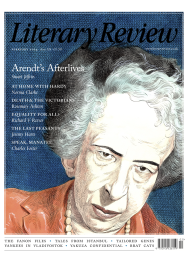Susan Owens
In Search of Lost Climes
Time and Tide: The Long, Long Life of Landscape
By Fiona Stafford
John Murray 304pp £20
Fiona Stafford is the author of two previous nature books, the acclaimed The Long, Long Life of Trees and its sequel, The Brief Life of Flowers. Each of the books’ chapters takes a particular subject and briskly examines it through a series of lenses: nature, history, literature, folklore, art. An oak, say, or a rose becomes a door through which the reader is expertly guided into an unfolding cultural landscape (Stafford is professor of English at Somerville College, Oxford). In some ways, Time and Tide is a very different beast. Although ostensibly structured in a similar fashion, the nineteen brief chapters of this deeply personal book have oblique, suggestive titles, such as ‘Drained’, ‘Otters and Cockles’, ‘Here Be Dragons’ and ‘The Waves’. At first I missed the unambiguous signposts of her previous nature books – as a reader, I like to know what I’m in for – and I was some way through the book before a revealing phrase from the prologue drifted back into my mind. In it, Stafford collages words from Gerard Manley Hopkins’s poem ‘Pied Beauty’ into her own. ‘Places are lit up’, she writes, ‘by what is out of the ordinary, by what’s counter, original, spare and strange.’ I realised that what at first strikes the reader as a bewildering, wandering narrative is in fact gently underpinned by the theme of the out-of-place. Throughout the book, Stafford demonstrates that focusing on relics, oddities and traces of the not-quite-vanished can be a rewarding way of thinking about landscape and history.
Stafford is drawn to in-between, often watery places: the Fens, the Solway Firth, the suspension bridge that crosses the Humber. The viewpoints she chooses are often as oblique as her chapter titles: she is more likely to descend into caves and mines than to enjoy a conventional hilltop prospect, and

Sign Up to our newsletter
Receive free articles, highlights from the archive, news, details of prizes, and much more.@Lit_Review
Follow Literary Review on Twitter
Twitter Feed
Under its longest-serving editor, Graydon Carter, Vanity Fair was that rare thing – a New York society magazine that published serious journalism.
@PeterPeteryork looks at what Carter got right.
Peter York - Deluxe Editions
Peter York: Deluxe Editions - When the Going Was Good: An Editor’s Adventures During the Last Golden Age of Magazines by Graydon Carter
literaryreview.co.uk
Henry James returned to America in 1904 with three objectives: to see his brother William, to deliver a series of lectures on Balzac, and to gather material for a pair of books about modern America.
Peter Rose follows James out west.
Peter Rose - The Restless Analyst
Peter Rose: The Restless Analyst - Henry James Comes Home: Rediscovering America in the Gilded Age by Peter Brooks...
literaryreview.co.uk
Vladimir Putin served his apprenticeship in the KGB toward the end of the Cold War, a period during which Western societies were infiltrated by so-called 'illegals'.
Piers Brendon examines how the culture of Soviet spycraft shaped his thinking.
Piers Brendon - Tinker, Tailor, Sleeper, Troll
Piers Brendon: Tinker, Tailor, Sleeper, Troll - The Illegals: Russia’s Most Audacious Spies and the Plot to Infiltrate the West by Shaun Walker
literaryreview.co.uk